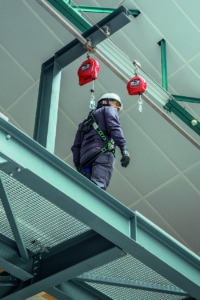SHP hears from Dr Karen McDonnell at RoSPA who analyses the consistent dangers of working at height…
Although the UK is one of the safest places to work in the world, with consistently one of the lowest rates of fatal injury across the European Union, I am often saddened and disappointed whenever I read the annual injury statistics.
That’s because people are still having what I call “old” accidents – leading to those types of injuries that, despite decades of advancement in occupational safety leading to huge strides being made in prevention, are still happening today.
 Falls from height consistently cause the most deaths to British workers, accounting for around a quarter of the total number of fatalities every year. In 2021/22, 29 workers died due to a fall from height, with 35 deaths in 2020/21 and 29 in 2019/20. The annual average number of fatalities due to falls from height over the last five years is 35.
Falls from height consistently cause the most deaths to British workers, accounting for around a quarter of the total number of fatalities every year. In 2021/22, 29 workers died due to a fall from height, with 35 deaths in 2020/21 and 29 in 2019/20. The annual average number of fatalities due to falls from height over the last five years is 35.
Such falls also accounted for eight per cent (45,200) of the 565,000 employee reported non-fatal injuries in 2021/22. That’s the equivalent of 123 injuries every day – a staggering scale of pain, suffering and disruption.
In 2018, the All Party Parliamentary Group for Working at Height held a wide-ranging inquiry and consultation into working at height, and why people are still dying from falls. In April 2019, they launched a report which made a number of recommendations for both employers and regulators.
The Work at Height Regulations 2005 set out specific duties for employers and employees which are designed to prevent death and injury caused by a fall from height and the All Party Parliamentary Group for Working at Height’s report concluded that the law had resulted in an overall reduction in the number of falls.
Unfortunately, this legislation is one of many currently at risk under the Retained EU Law (Revocation and Reform) Bill.
Under the Bill, the Government is committed to repealing or replacing over 4,000 pieces of legislation taken from the UK’s previous membership of the European Union by December 2023, including a wide range of workplace safety laws.
RoSPA is concerned that the December deadline does not offer enough time to conduct a thorough review and consultation process and could lead to the loss of many lives by leaving people insufficiently protected.
However, if the deadline was extended to allow for a full consultation and review process, the Bill could also offer an opportunity for positive change through more effective, improved legislation.
We need messages about safety to get to those hard-to-reach places, and beyond that, to make people think about what they are doing in their day-to-day home lives too, because outside of the workplace, falls are also a massive issue. They are single biggest cause of accidental injuries in the home and the largest cause of accidental death among over-65s in the UK.
As employers, we need to ensure we are engendering in our staff behaviour which they will carry over the threshold into the outside world. Rather than leaving good health and safety practice behind when we clock out every day, we must recognise that our people are at the heart of organisational sustainability and ensure that our health and safety messages are carried by them wherever they are, so we can address the huge burden – not to mention impact on the bottom line – that falls can create, wherever they happen.
The Safety Conversation Podcast: Listen now!
The Safety Conversation with SHP (previously the Safety and Health Podcast) aims to bring you the latest news, insights and legislation updates in the form of interviews, discussions and panel debates from leading figures within the profession.
Find us on Apple Podcasts, Spotify and Google Podcasts, subscribe and join the conversation today!

 Falls from height consistently cause the most deaths to British workers, accounting for around a quarter of the total number of fatalities every year. In 2021/22, 29 workers died due to a fall from height, with 35 deaths in 2020/21 and 29 in 2019/20. The
Falls from height consistently cause the most deaths to British workers, accounting for around a quarter of the total number of fatalities every year. In 2021/22, 29 workers died due to a fall from height, with 35 deaths in 2020/21 and 29 in 2019/20. The 